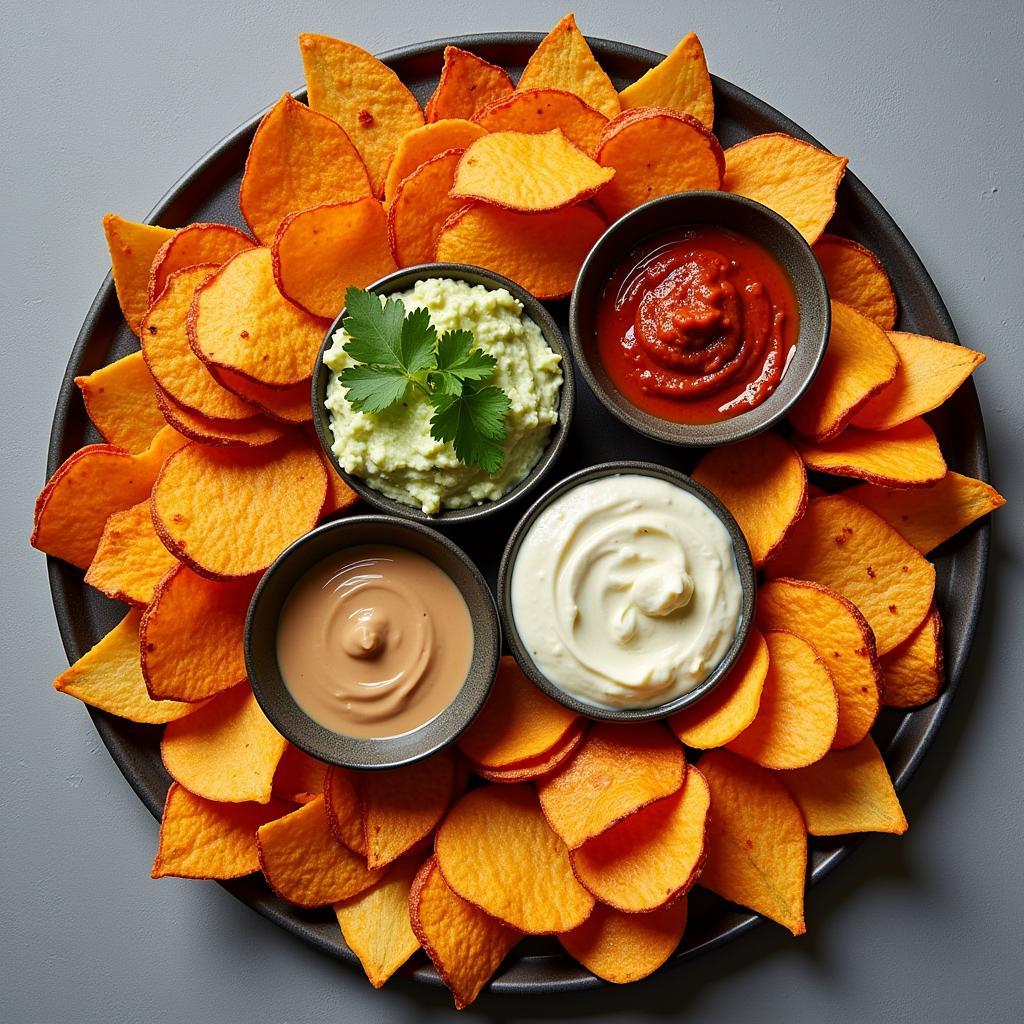A Delicious Dive into African Chips
African Chips, a culinary delight found throughout the continent, offer a diverse range of flavors and textures far beyond the familiar potato. From root vegetables like cassava and sweet potato to plantains and even breadfruit, African chips showcase the ingenuity and agricultural richness of the region. These crispy treats, often seasoned with unique spice blends, are enjoyed as street food snacks, side dishes, and even bar snacks, holding a special place in African cuisine. Let’s explore the fascinating world of African chips.
Beyond the Potato: Exploring the Variety of African Chips
African chips aren’t limited to just potatoes. A plethora of root vegetables, fruits, and even breadfruit are transformed into delicious crispy snacks. Cassava, a staple crop across Africa, is frequently sliced, fried, and seasoned to create a chip that’s both satisfyingly crunchy and subtly sweet. Sweet potato chips, with their vibrant orange hue and naturally sweet flavor, offer a delightful alternative. Plantain chips, ranging from savory to sweet depending on ripeness, are another popular choice, often enjoyed with a spicy dipping sauce.
Cassava Chips: A Staple Snack Across the Continent
Cassava chips are a cornerstone of African snack culture. Their versatility allows for a wide range of flavor profiles, from simple salt and pepper to more complex spice blends incorporating chili, ginger, and garlic. The preparation methods vary across regions, contributing to distinct textures, from thin and crispy to thick and chewy.
What makes cassava chips so popular? Their affordability, long shelf life, and ability to pair well with various dips and sauces make them a convenient and beloved snack. African finger foods are a popular culinary tradition, and cassava chips are a prime example of this delicious and convenient food culture.
The Cultural Significance of African Chips
African chips are more than just a snack; they hold cultural significance in many communities. They are often shared during social gatherings, celebrations, and festivals, representing a sense of community and togetherness. In some cultures, specific types of chips are associated with particular events or ceremonies, further emphasizing their cultural importance.
A Symbol of Community and Celebration
Imagine the lively atmosphere of a bustling marketplace, the aroma of frying plantains filling the air, and the sound of laughter as friends share a bag of freshly made chips. This scene encapsulates the social aspect of African chips, which often serve as a focal point for social interactions and shared experiences.
“African chips are a fundamental part of our culinary heritage,” explains Dr. Adeola Olaniyan, a renowned anthropologist specializing in African food culture. “They represent more than just sustenance; they symbolize community, celebration, and the rich agricultural diversity of the continent.”
From Street Food to Gourmet: The Versatility of African Chips
African chips can be found everywhere from bustling street corners to upscale restaurants. Street vendors often sell freshly made chips, seasoned with local spices, offering a quick and affordable snack. In restaurants, chefs are increasingly incorporating these versatile ingredients into their dishes, elevating them to gourmet status with innovative flavor combinations and presentations. You can even find some of these delicious african food online. This adaptability demonstrates the enduring appeal and culinary potential of African chips.
A Culinary Canvas for Innovation
“The versatility of African chips allows chefs to explore a vast array of flavors and textures,” says Chef Kwame Asante, a celebrated chef known for his modern interpretations of traditional African cuisine. “From spicy plantain chips with a mango salsa to delicate cassava chips with a smoked paprika aioli, the possibilities are endless.”
 A gourmet platter of African chips with various dipping sauces. Don’t forget to check out other unique african art on thin wood.
A gourmet platter of African chips with various dipping sauces. Don’t forget to check out other unique african art on thin wood.
Conclusion
African chips, in their myriad forms and flavors, represent a vibrant aspect of African cuisine. From their humble origins as street food snacks to their elevated presence in gourmet restaurants, these crispy treats have captured the hearts and palates of people across the continent and beyond. Exploring the world of African chips is a delicious journey into the heart of African culture, showcasing the ingenuity, resourcefulness, and vibrant flavors of this diverse and dynamic region.
FAQ
-
What are the most common types of African chips?
Cassava, sweet potato, and plantain chips are among the most popular. -
Where can I find African chips?
They are commonly sold by street vendors, in markets, and increasingly in restaurants. -
Are African chips healthy?
Like all fried foods, moderation is key. However, they offer valuable nutrients depending on the base ingredient. -
How are African chips seasoned?
Seasoning varies widely, from simple salt and pepper to complex spice blends. -
Can I make African chips at home?
Absolutely! Many recipes are readily available online. -
What are some popular dipping sauces for African chips?
Spicy chili sauces, peanut sauce, and various aiolis are popular choices. -
What is the cultural significance of African chips?
They are often shared during social gatherings and celebrations, representing community and togetherness.
Do you have any questions? Want to learn more about the fascinating world of African Cuisine? You might be interested in our articles about african famous banana or even learn about african grey parrots how it build its home.
When you need assistance, please contact us: Phone: +255768904061, Email: kaka.mag@gmail.com or visit our address: Mbarali DC Mawindi, Kangaga, Tanzania. We have a 24/7 customer support team.
